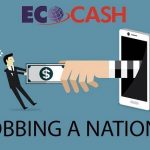The situation could be worse. In an article for the Nation entitled: Is USAID helping Haiti to recover, or US contractors to make millions?, Jake Johnston said: “For every $1 that USAID has spent, less than one penny went directly to Haitian organizations, be it the Haitian government or in Haiti’s private sector.”
A typical example of how United States organisations and companies benefit from US aid was exposed three months after the US imposed sanctions on Zimbabwe in 2003. In a cable to Washington on 4 June 2003, US ambassador to Zimbabwe Joseph Sullivan spelt out how USAID would parcel out jobs to US companies and organisations should Zimbabwe President Robert Mugabe be ousted – starting from running elections to business for US corporations.
“We could help the transition government’s most pressing task – carrying out free and fair elections, our top Mission Performance Plan goal. USAID should provide assistance and expertise to establish an Independent Electoral Commission,” the cable said.
“In order to promote an environment in which candidates and parties can wage open and non-violent election campaigns, the GOZ will need to repeal/amend an existing body of repressive legislation, including the Public Order and Security Act, the Access to Information and Protection of Privacy Act, the Elections Act and the Media and Broadcasting Act.
“As the new election approaches, USAID would fund the training and deployment of election observers, polling agents for political parties, transparent ballot boxes and computerized voter rolls. We would also continue Voice of America and independent media support.
“Using existing mechanisms such as National Democratic Institute, International Republican Institute and State University of New York/Albany, we estimate additional total cost at $7 million. Some of these costs could be shared with other donors, although we think that USAID, NDI,IRI, and SUNY are in the best position to lead these activities.”
The US was prepared to bend its law which prohibited loans to Zimbabwe so that US corporations could get business in Zimbabwe. “In a reform environment, we also recommend OPIC and ExIm Bank consider loan guarantees for projects that promote US exports and shore up Zimbabwe’s dilapidated infrastructure.
“This could involve badly-needed rejuvenation of General Electric locomotives at the National Railway of Zimbabwe, Caterpillar machines at coal-miner Wankie Colliery and Boeing jets at Air Zimbabwe.
“Furthermore, the country’s participation in African Growth and Opportunity (AGOA) sessions as an observer (with full admission following free and fair elections) would allow Zimbabwean firms to plan a reentry into the US market. (Most US-bound textile production here has migrated to AGOA countries.) We should also explore possibilities for including Zimbabwe in free trade negotiations with the Southern Africa Customs Union.”
Continued next page
(224 VIEWS)


